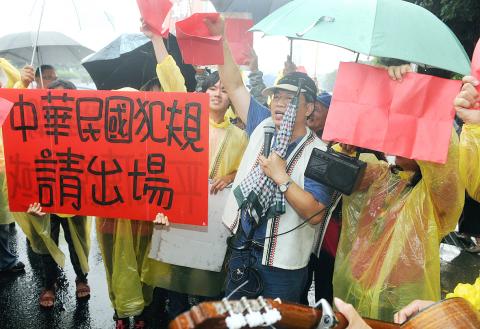Standing amid a thunderstorm, dozens of Pingpu Aborigines yesterday gathered on Ketagalan Boulevard in front of the Presidential Office in Taipei for the International Day of the World’s Indigenous Peoples to protest against the government’s denial of their Aboriginal status.
“We are now standing on the land that was once the traditional domain of the Ketagalan — one of the Pingpu Aboriginal tribes,” Siraya Cultural Association spokeswoman Uma Talavan said. “The Republic of China (ROC) occupies our land, the Presidential Office stands on traditional Ketagalan land, but refuses to recognize us as Aborigines.”
“The government is pushing us into annihilation,” she added.

Photo: Liao Chen-huei, Taipei Times
Talavan said in the past decade, the government has always said it would “look into the issue,” but thus far, no conclusion has been reached. Pingpu Aborigines comprise several Aboriginal tribes that once lived in the country’s flat areas.
While most of the Pingpu Aborigines have lost their cultures and languages, and adopted those of Han Chinese, some are intent on keeping their identity and are campaigning for the government to officially recognize them as Aborigines.
However, despite more than 20 years of efforts, they still have not been granted official status.
“A regime that does not respect the first inhabitants of the island is an illegitimate regime,” Presbyterian Church of Taiwan pastor Lee Hsiao-chung (李孝忠) said.
“Let’s take out our red cards, and show them to the ROC government, it’s time for us to tell it to get out of Taiwan,” he said, referring to the penalty given in soccer to kick a player out of the game.
Jason Pan (潘紀揚), a representative of the Pazeh Pingpu Aboriginal tribe, said that without Pingpu Aborigines, Taiwanese culture and history would be incomplete.
“We cannot allow the Pingpus to vanish. We are here because we want to tell the ROC government and the world that the Pingpu Aborigines are still here, alive and well,” Pan said.
Representatives of the demonstrators were received by a Presidential Office public relations officer, who listened to their petitions.
“We met with a new public relations officer surnamed Lee (李) and we think she’s better than the one we met before,” Talavan said after the meeting. “She listened more attentively, showed more interest and I felt she was more sincere.”
Talavan said Lee had said there was a discrepancy between the information provided by Pingpu groups and the Council of Indigenous Peoples and said she would research the issue herself.

Taiwan is to commence mass production of the Tien Kung (天弓, “Sky Bow”) III, IV and V missiles by the second quarter of this year if the legislature approves the government’s NT$1.25 trillion (US$39.78 billion) special defense budget, an official said yesterday. Commenting on condition of anonymity, a defense official with knowledge of the matter said that the advanced systems are expected to provide crucial capabilities against ballistic and cruise missiles for the proposed “T-Dome,” an advanced, multi-layered air defense network. The Tien Kung III is an air defense missile with a maximum interception altitude of 35km. The Tien Kung IV and V

The disruption of 941 flights in and out of Taiwan due to China’s large-scale military exercises was no accident, but rather the result of a “quasi-blockade” used to simulate creating the air and sea routes needed for an amphibious landing, a military expert said. The disruptions occurred on Tuesday and lasted about 10 hours as China conducted live-fire drills in the Taiwan Strait. The Civil Aviation Administration (CAA) said the exercises affected 857 international flights and 84 domestic flights, affecting more than 100,000 travelers. Su Tzu-yun (蘇紫雲), a research fellow at the government-sponsored Institute for National Defense and Security Research, said the air

A strong continental cold air mass is to bring pollutants to Taiwan from tomorrow, the Ministry of Environment said today, as it issued an “orange” air quality alert for most of the country. All of Taiwan except for Hualien and Taitung counties is to be under an “orange” air quality alert tomorrow, indicating air quality that is unhealthy for sensitive groups. In China, areas from Shandong to Shanghai have been enveloped in haze since Saturday, the ministry said in a news release. Yesterday, hourly concentrations of PM2.5 in these areas ranged from 65 to 160 micrograms per cubic meter (mg/m³), and pollutants were

Taiwan’s armed forces have established response protocols for a wide range of sudden contingencies, including the “Wan Chun Plan” to protect the head of state, the Ministry of Defense (MND) said today. After US President Donald Trump on Saturday launched a series of airstrikes in Venezuela and kidnapped Venezuelan President Nicolas Maduro, concerns have been raised as to whether China would launch a similar “decapitation strike” on Taiwan. The armed forces regularly coordinate with relevant agencies and practice drills to ensure preparedness for a wide range of scenarios, Vice Minister of National Defense Hsu Szu-chien (徐斯儉) told reporters before a